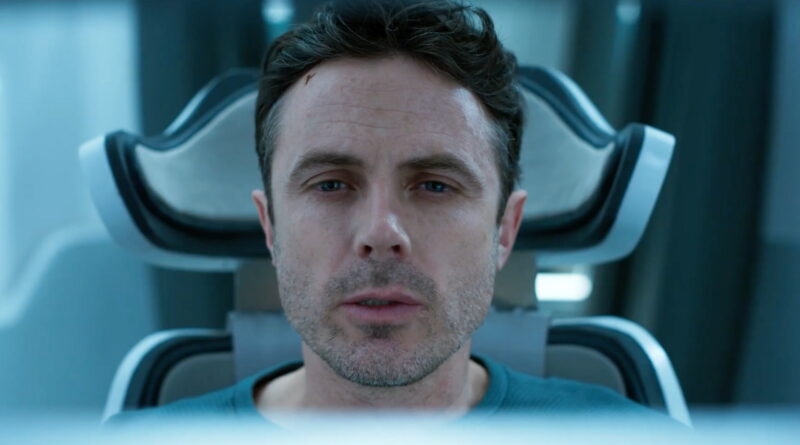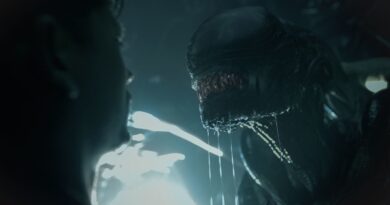Slingshot (2024)
Mikael Håfström’s Slingshot works in much the same way as Florian Zeller’s The Father: The audience is kept in the same perpetual state of confusion as the main character. By the end of both films, we’re none the wiser as to what has and has not been happening, and neither is the protagonist. The difference, of course, is that The Father is about an elderly man with dementia while Slingshot is about an astronaut in deep space losing his grip on reality. If that makes it sound like a rehash of films like Solaris or Event Horizon, let me assure you that it isn’t. And if by the end you feel cheated out of a concrete explanation, you’ve missed the point entirely. Concrete explanations elude the lead character, so it only stands to reason they should elude us too.
The main character is John (Casey Affleck), a solitary, career-driven astronaut who, at an unspecified future time, is on an interstellar mission to collect natural resources from Titan, the only one of Saturn’s many moons with the potential for human colonization, and return them to Earth. This is part of an ambitious plan to colonize Titan, Earth having been all but destroyed by the effects of global warming. This first trip to the moon is a mission unto itself, one that will take many years. This means, of course, that John must repeatedly go into extended periods of drug-induced hibernation. As the ship’s computer says every time he wakes up, the side effects of the sleeping drug can include confusion, nausea, and disorientation.
The most important part of the journey to Titan is the planet Jupiter; it has the gravitational forces necessary to produce a slingshot effect that will increase speed, therefore shaving time off the trip. Pulling off something this risky will require John and his crewmates Nash (Tomer Capone) and Captain Franks (Laurence Fishburne) to work together, like interlocking cogs spinning in a well-oiled machine. At first, they do. But then a gradual mental decline begins to take hold of them all. The alarmist Nash is pushed into a paranoid tailspin, to the extent that he wants John to help him commit mutiny. Indeed, Captain Franks seems like an even-tempered, rational man. But there comes a point where his logical thinking begins to sound like manipulation and psychological gameplay. A psychotic monster could be hiding behind the facade.
As for John, there’s more going on than every hibernation cycle weakening him physically. His ability to complete daily tasks – piloting the ship, checking all the important levels, ensuring the communication system is up and running, even when 600 million miles away from Earth – always compete with memories of Zoe (Emily Beecham), the proverbial girl he left behind. The film is essentially a series of back-and-forth cuts between the Titan mission and scenes of John and Zoe. Despite the physical love they share, they’re both unsure about what they feel emotionally. They tell themselves, and each other, that a relationship can’t get in the way of the mission. But maybe they have fallen in love. It’s easier for Zoe to consider this than John; though not intentionally languid and aloof, being a loner is what he’s used to.
Of course, that very personality trait may be contributing to his loosening grip on reality. He knows Zoe isn’t on the ship with him, even though he begins physically seeing her. Is he hearing communications on the portable radios? It can’t be. They would take months to reach him. Besides, they would be made on the main monitor on the bridge, not on a tiny personal device. And perhaps he’s an easy target for Captain Franks, who seems to relish burrowing into his psyche and making him second guess everything he thinks he knows. When ordered to go back into hibernation, does he see a sudden violent attack just outside the sleeping tube? Or has he had too much of the drug that puts him under? Does he finally make sense of the situation, or is he just cobbling together explanations that would make the most sense?
We come full circle to explanations. This movie doesn’t provide any – no, not even with the final shot, which seemingly answers every question we’ve had. It answers nothing. In that moment, the audience is actively doing what John may have been doing all along: Coming to conclusions on the mere basis of what makes the most logical sense. The only thing I can say with certainty is that Slingshot is the best mind-you-know-what I’ve had in some time. It’s a maddening, confusing movie about madness and confusion. It’s not as emotionally compelling or devastating as The Father, but we’re dealing with a science fiction psychological thriller here, not a drama about the indignity that losing your mind forces onto you.




